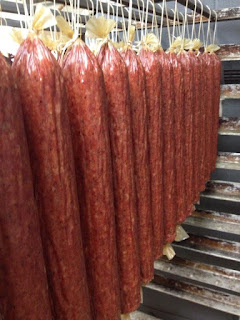 |
| I'm not sure why I have this silly face. I love to take #meatcounterselfies! |
A few weeks ago, I made a quick stop in a local grocery
store to pick up some stuff for office lunches. Of course, I had to swing by
the meat counter for a #meatcounterselfie.
While I was there, I found four different examples of
packaging ground beef in the retail case. So, I snapped a few pictures and made
a quick facebook post. My post was so popular, I decided to recreate here in
the blog.
 |
| Foam trays with over wrap. One of the most popular types of packaging |
Foam trays with over wrap. It's kinda like cling wrap. In the world of
meat science, we call this aerobic packaging. It's aerobic because it allows
oxygen to react with the protein and creates the bright
red color consumers like to see.
This packaging type is
pretty inexpensive and easy, but the oxygen makes the meat spoil in a couple of
days. You also shouldn't freeze meat packaged this way because it's more likely
to freezer burn.
 |
| Ground beef chubs |
We call these packages ground beef chubs. These are 10-pound
packages, but you can get chubs in 5-pound, 2-pound, and even 1-pound. They are
not always in clear bags like this. Sometimes the chubs are white and only tie at
one end.
This beef was packaged
in the packing plant. That's good because it decreases the number of people
that handled it and lowers the chances that it will spoil. They are essentially
a vacuum package, which is why you see that purplish-red color. The vacuum
isn't perfect. Sometimes a little air will get in on the ends.
Beef can stay safely in
this package for several days, and you can stick it directly in the freezer.
My friend, Dr. Casey Owens, commented that she likes to buy ground beef in
these big chubs and divide it into 1-pound portions in zip-loc freezer bags.
That’s a great way to save some money.
 |
| Modified atmosphere package |
This is called a modified-atmosphere package. This
ground beef was also packaged in the packing plant, so the number of times it’s
been handled is decreased compared to foam tray packaging. It's kind of like a vacuum package because it's sealed,
but it has a special blend of air in the package to help control the growth of
bacteria and give the meat that pretty red color.
I wouldn't use this
package to freeze the meat; I would re-package it in a zip-loc freezer bag or a
home-vacuum packager.
 |
| Vacuum-sealed package |
Last is a vacuum sealed package. This beef was
packaged in the packing plant and is a completely sealed package. See how it's
a purplish-red color?
This package will have
the longest shelf-life, and meat will freeze in that package just fine. It's also
nice and flat, so it will thaw easily, too.
The meat counter at this store had several different options
of ground beef, and, as a meat head, it was exciting to me to see all these
different ways to package it represented in one store. But, please know that
all these packaging types are safe. Regardless of how the beef is packaged or
processed or any claims made on the label, all ground beef should be cooked to
160 F and checked with a meat thermometer.
I have another neat post called 10
things you didn’t know about ground beef or you may enjoy any of my other
posts about beef,
food safety,
or the labels
you see on packages.
What questions do you have about things you see in the meat
counter?

















